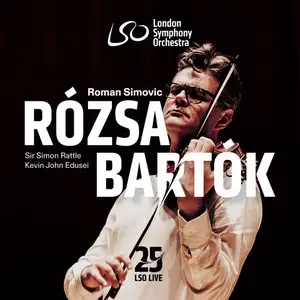
Miklós Rózsa (1907-1995)
Violin Concerto, Op. 24
Béla Bartók (1881-1945)
Violin Concerto No. 2, Sz. 112, BB 117
Roman Simovic (violin)
London Symphony Orchestra/Sir Simon Rattle (Rózsa), Kevin John Edusei (Bartók)
rec. live, 17 June 2022 (Rózsa), 26 October 2022 (Bartók), Jerwood Hall, LSO St Luke’s, London
LSO Live LSO0886 [73]
There’s a welcome trend in concerto recordings of orchestral principals taking the solo part, accompanied by their colleagues. In the last couple of months alone, I have very much enjoyed the excellent account by Charlie Lovell-Jones of the Walton Violin Concerto on Chandos (CHSA5360) with the Sinfonia of London and Theodor Lyngstad’s superb coupling of Kabalevsky’s Second and Schumann’s Cello Concertos with the Copenhagen Philharmonic on OUR (8.2226926). Now LSO Live give us the magisterial Roman Simovic playing Bartók’s Violin Concerto No. 2, inventively paired with the much less well known Violin Concerto of Miklós Rózsa.
Rózsa is well known as a composer of film music, writing first for Alexander Korda’s company in London and then moving to MGM in Hollywood. He wrote over 90 film scores and won three Oscars, including one for his score for Ben Hur. What is perhaps less well known is that as part of his contract with MGM, he negotiated a clause allowing him to take three months leave every summer to work on concert music. In the first summer of this arrangement he decided to write a violin concerto with Jascha Heifetz, with whom he was slightly acquainted, as his ideal soloist. After seeing the draft of the concerto, Heifetz agreed to perform it and worked on some technical points with Rózsa before giving the premiere in Dallas in January 1956. Heifetz recorded the work shortly afterwards for RCA and had the field to himself for more than 40 years before some more recent recordings, the best of which I think is Baiba Skride on Orfeo (C932182A).
Roman Simovic launches headlong into the Concerto in his live performance with Simon Rattle and the LSO. This feels right – there’s certainly no point in being tentative – and the sound of his lustrous playing soaring above the orchestra is exhilarating, as is his perfectly placed double stopping which follows. Rattle and the LSO maintain a pattern of spiky unease and restlessness throughout, with only Simovic’s lovely duet with the horn suggesting a sense of repose. The cadenza, when it comes, is electric. The second movement is a beautiful nocturne, lusciously played, with Simovic and Rattle making the most of the distinctly Hungarian echoes. The finale in this performance sounds like an ongoing skirmish between soloist and orchestra, which is entirely compelling, and the hectic rhythmic momentum left me feeling dizzy by the end, which I’m sure is what the performers and composer intended. It’s striking that Rózsa permitted Billy Wilder to use some of this music later for the 1970 film The Private Life of Sherlock Holmes, where the finale’s opening was the theme associated with the Loch Ness monster! Baiba Skride’s account with the Gothenburg Symphony and Santtu-Matia RouvaIi is not a live recording. It doesn’t quite have the same sense of excitement as this newcomer, but it is a little more considered and precise and gives the listener scope to take a breath. I would want to have both in my library.
The draw for me to this disc was the Rózsa, but I wouldn’t want to downplay Simovic’s excellent performance of the Bartók Second Concerto (although it was the only one Bartók sanctioned for public performance in his lifetime). In a much more crowded field of competitors, he gives an exciting, thoughtful and virtuosic account, whose placement after the Rózsa is revelatory in illuminating its influence on the later work. At the start of both pieces you hear this strikingly, where Rózsa’s opening theme seems deliberately reminiscent of Bartók’s. Overall, the work has the same rooting in Hungarian idioms and a similar rhythmic complexity, and the solo violin writing in both a distinctive bittersweetness. Rózsa’s orchestration is perhaps unsurprisingly more tonal and conventional than the Bartók of the 1930s, and has none of what Jan Smaczny describes in his booklet notes as Bartók’s ‘extraordinary harmonic ferocity’.
Simovic has a different conductor for the Bartók, Kevin John Edusei. As a soloist, he must take credit then, along with the orchestra, for bridging these two works as thoughtfully as he does, educating us in the best possible way. I don’t know if his rendition of the Bartók would necessarily be my first choice, but having these two works on disc together with the same soloist feels an essential addition to the catalogue.
The recording of both performances is up to the usual standards of LSO Live excellence. The booklet notes for each work are interesting and helpful, but they are written by different authors, I assume taken from the programme notes for each concert. This means there is no comparative analysis, which feels like a missed opportunity.
I realised when reviewing this that it’s been a while since I possessed a physical LSO Live release. It’s a genuinely tasteful object: a beautifully printed hardback with the SACD in a sleeve at the end. It’s lovely to see such care being taken to present precious music-making appropriately.
Dominic Hartley
Previous review: Paul R Jackson (December 2024 Recording of the Month)
Buying this recording via a link below generates revenue for MWI, which helps the site remain free



















